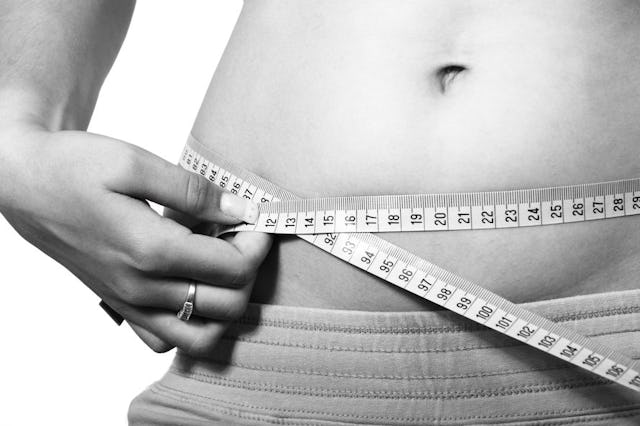The Scale Isn't The Boss Of My Self-Esteem Anymore

I had to take some Prozac. I had to take some Prozac because I needed an SSRI in my life. My particular drug cocktail requires an SSRI, and the Zoloft stopped working. We picked Prozac, ironically, because all the other drugs had such high weight gain profiles.
This is your cue to laugh at me.
I was wearing dresses every single day, so I didn’t have the slow creep of tight jeans and ill-fitting shirts. I just…got fat. I went from a size 8/9 to a 14/16, from medium to XL/XXL. I started buying dresses in XL, but I figured it was my bangin’ double H cups that made things fit too tight or too short. Nope.
I woke up one day in the middle of the summer, looked in the mirror, and grabbed my I-look-4-months-pregnant tummy. Oh fuck, I thought. I got fat.
Well, not fat-fat, but fat for me. I used to weigh 120 pounds before babies, and I was coming from a size 8 (sometimes a 6 on a good day with Spanx and a prayer). But I was the size of a normal American woman now, the smallest size Lane Bryant and Cacique carry.
I sort of freaked out and threw away my Prozac, figuring the other drugs would pick up the slack. (They did, but I don’t recommend this strategy and neither does my psychiatrist.) I thought that once I stopped the Prozac, the weight would just…come off. Right? Right?
Nope. I lost around 10 pounds in water weight and then stalled. I decided to get out my scale. (This scale is an analog from the ancient days.) I stepped on it, and it said 180 pounds.
I stepped off and cried.
If you live in America in 2016 and you’re female, what does society tell you to do when you step on the scale and see the number 180? You cry. You cry a lot of big, fat tears because now even your tears are fat. Then you get mistaken for pregnant — twice.
“You don’t look like you weigh that much,” my husband said.
“Well, I do,” I snarked back. “The scale says so.”
I had to get this weight off of me. I started a strict, modified paleo diet, and I didn’t cheat. I began to run a Couch to 5K, which meant running three days a week, every week.
After two weeks, I stepped back on the scale. It still said 180 pounds. It hadn’t moved.
I cried. I weighed that much after I had my second son. And I’d seen those pictures, with the double chin and the pudgy face. I didn’t see it in the mirror, but I saw it in my mind. I cried harder.
After five weeks, I knew I’d lost weight. My belly was noticeably smaller — small enough that no one would mistake me for pregnant. I felt better. I could run for eight minutes at a time. My psychiatrist told me not to bother with a scale, but to trust my body instead. She said it was healthier.
I stepped on the scale. It said 180 pounds.
I kicked it under the dresser so hard I bruised my toe. That was the end. My clothes fit better. My stomach was smaller. I felt like I was losing weight. Maybe I was losing weight and gaining muscle, which weighs more. Maybe I was just stuck at one weight and my body was changing. However it was changing, I was happy with it. I was getting smaller, getting tighter, getting fitter. I had more energy.
That scale was taking up valuable under-dresser space, so I threw it out. It felt fantastic. I didn’t care if I wore Lane Bryant sizes for the rest of my life. I looked better and felt better.
And suddenly I realized that was the important thing, not some arbitrary number that could fluctuate depending on whether I’d pooped yet that day or drank enough water, or drank too much water. It didn’t matter anymore.
Before I’d realized I was “fat,” I felt fine about myself and my body. But as soon as I saw that number, I was in pieces. Seeing that 180 pounds had me fantasizing about lipo and stomach staples.
But that number didn’t change, despite my (no cheating) diet and my (religious) running. My clothes fit better. I felt better. There was something wrong with the scale — not wrong with me. It was freeing to toss it in the trash, like cutting off a toxic friend. I understand it could have its uses for some people. But for me, it’s damaging.
And so is the word “fat.” Fat isn’t inherently negative. It carries a perception of the negative, of the unhealthy, of the lazy or slovenly. I am none of those things. So why should I accept those connotations? Like my scale, I threw them out.
And now, when someone says I look good, I choose to believe them.